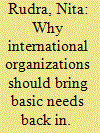| Srl | Item |
| 1 |
ID:
176216


|
|
|
|
|
| Summary/Abstract |
Security discourse has radically changed over the years, especially since the Post–Cold War period. The traditional concept focuses on state security and national security, and is essentially based on realist and neo-realist paradigms. However, in 1994, the United Nations Human Development Report for the first time elaborated the notion of human security and the associated Human Development Index (HDI). Human security advocates a people-centric approach to security. The two foundational principles on which human security is based are “freedom from fear” and “freedom from want.” I evaluate the notions of state security versus human security and examine how South Asian countries have fared regarding the human security indices. I conclude that, despite advances in some areas, various HDI parameters show that the human security record is still rather dismal in South Asia. There remains a critical need to improve it.
|
|
|
|
|
|
|
|
|
|
|
|
|
|
|
|
| 2 |
ID:
170220


|
|
|
|
|
| Summary/Abstract |
Both research and development (R&D) and military expenditure are pivotal areas for any country’s economy. However, most countries tend to spend more on military because of global insecurity and power politics. Nevertheless, this study shows the merit of R&D investment and how it contributes to the national human capital. An analysis was undertaken on the gap between R&D and military expenditure considering the Human Development Index (HDI) and Gross Domestic Product (GDP) of 76 countries for a period of 15 years (2000–2014). Mixed effect models were applied to adjust the effect of six different continents. The results showed that HDI has a positive bi-directional significant relationship with higher R&D investment. National spending on R&D builds human capital, which in turn contributes to public development over the years, unlike military expenditure that only marginally contributes towards GDP and makes no contribution to HDI.
|
|
|
|
|
|
|
|
|
|
|
|
|
|
|
|
| 3 |
ID:
098699


|
|
|
|
|
| Publication |
2010.
|
| Summary/Abstract |
The Brazilian government has the ambition to provide complete electricity coverage for all citizens as a means to promote development and reduce inequalities. Full coverage implies the provision of electricity to 15 million people in the country by the end of 2010 through the program Luz para Todos (LPT - light for all) launched in 2003. So far, 11 million people have benefited, 2 million of which live in the Amazon. In this paper, we analyze the linkages between development and rural electrification through the Human Development Index (HDI) and within the context of the Amazon. We examine the suitability of the HDI as a planning and monitoring tool for improving energy access and development. We show that the recognition of electricity access as a driver for development has led to concrete goals for electrification, actual action and welfare improvement. Our study serves to highlight the role of LPT in the development of the Amazon region, and the specific features and achievements of the Brazilian policy for universal electrification. We conclude that some challenges related to the electrification of isolated areas still lie ahead. We finalize with a discussion on the relevance of the Brazilian experience to other developing countries.
|
|
|
|
|
|
|
|
|
|
|
|
|
|
|
|
| 4 |
ID:
098700


|
|
|
|
|
| Publication |
2010.
|
| Summary/Abstract |
The Brazilian government has the ambition to provide complete electricity coverage for all citizens as a means to promote development and reduce inequalities. Full coverage implies the provision of electricity to 15 million people in the country by the end of 2010 through the program Luz para Todos (LPT - light for all) launched in 2003. So far, 11 million people have benefited, 2 million of which live in the Amazon. In this paper, we analyze the linkages between development and rural electrification through the Human Development Index (HDI) and within the context of the Amazon. We examine the suitability of the HDI as a planning and monitoring tool for improving energy access and development. We show that the recognition of electricity access as a driver for development has led to concrete goals for electrification, actual action and welfare improvement. Our study serves to highlight the role of LPT in the development of the Amazon region, and the specific features and achievements of the Brazilian policy for universal electrification. We conclude that some challenges related to the electrification of isolated areas still lie ahead. We finalize with a discussion on the relevance of the Brazilian experience to other developing countries.
|
|
|
|
|
|
|
|
|
|
|
|
|
|
|
|
| 5 |
ID:
087993


|
|
|
|
|
| Publication |
2009.
|
| Summary/Abstract |
An important milestone in the development debate is the recognition of poverty as a multidimensional phenomenon via the capabilities approach. However, a challenge remains in that many governments in less-developed countries continue to avoid prioritizing issues of absolute deprivation. This paper demonstrates how and why existing efforts to operationalize capabilities may distract policy makers from giving sufficient weight to issues of basic survival. We propose that international organizations can address this challenge through a method of triangulation: (1) identify how countries rank on universal goals of human development; (2) identify how countries rank on universal goals of basic needs provision; and (3) promote participatory poverty assessments. This approach ensures that absolute deprivation issues are addressed, and it establishes an acceptable (and necessary) balance between standardization and local complexity.
|
|
|
|
|
|
|
|
|
|
|
|
|
|
|
|